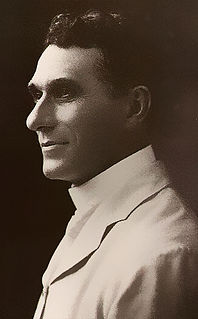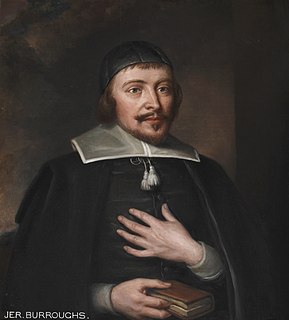A Quote by Aiden Wilson Tozer
Christian theology teaches the doctrine of prevenient grace, which briefly stated means this, that before a man can seek God, God must first have sought the man.
Related Quotes
This is the doctrine that we preach; if a man be saved, all the honor is to be given to Christ; but if a man be lost, all the blame is to be laid upon himself. You will find all true theology summed up in these two short sentences, salvation is all of the grace of God, damnation is all of the will of man.
It is grace at the beginning, and grace at the end. So that when you and I come to lie upon our death beds, the one thing that should comfort and help and strengthen us there is the thing that helped us in the beginning. Not what we have been, not what we have done, but the Grace of God in Jesus Christ our Lord. The Christian life starts with grace, it must continue with grace, it ends with grace. Grace wondrous grace. By the grace of God I am what I am. Yet not I, but the Grace of God which was with me.
Free-will doctrine-what does it? It magnifies man into God. It declares God's purposes a nullity, since they cannot be carried out unless men are willing. It makes God's will a waiting servant to the will of man, and the whole covenant of grace dependent on human action. Denying election on the ground of injustice, it holds God to be a debtor to sinners.
Through the years, I have discovered some essential principles in discerning God's will: First, by God's grace, we must be firmly committed to seeking first the Kingdom of God and His glory. Secondly, we must establish a life discipline of renewing our minds in the Word of God. Thirdly, we must seek godly counsel from mature believers. Fourthly, we must watch for signs of God's providence opening doors and closing them. Finally, we should consider the desires of our heart.
The ultimate difference between God's wisdom and man's wisdom is how they relate to the glory of God's grace in Christ crucified. God's wisdom makes the glory of God's grace our supreme treasure. But man's wisdom delights in seeing himself as resourceful, self-sufficient, self determining, and not utterly dependent on God's free grace.
The Christian religion, [Pascal] claims, teaches two truths: that there is a God who men are capable of knowing, and that there is an element of corruption in men that renders them unworthy of God. Knowledge of God without knowledge of man's wretchedness begets pride, and knowledge of man's wretchedness without knowledge of God begets despair, but knowledge of Jesus Christ furnishes man knowledge of both simultaneously.
What is sin? It is the glory of God not honored. The holiness of God not reverenced. The greatness of God not admired. The power of God not praised. The truth of God not sought. The wisdom of God not esteemed. The beauty of God not treasured. The goodness of God not savored. The faithfulness of God not trusted. The commandments of God not obeyed. The justice of God not respected. The wrath of God not feared. The grace of God not cherished. The presence of God not prized. The person of God not loved. That is sin.
First therefore let us seek the dignity of knowledge in the archetype or first platform, which is in the attributes and acts of God, as far as they are revealed to man and may be observed with sobriety; wherein we may not seek it by the name of Learning; for all Learning is Knowledge acquired, and all Knowledge in God is original: and therefore we must look for it by another name, that of Wisdom or Sapience, as the Scriptures call it.
If someone were to ask me whether I believed in God, or saw God, or had a particular relationship with God, I would reply that I don't separate God from my world in my thinking. I feel that God is everywhere. That's why I never feel separated from God or feel I must seek God, any more than a fish in the ocean feels it must seek water. In a sense, God is the "ocean" in which we live.
By His gracious condescension God became man and is called man for the sake of man and by exchanging His condition for ours revealed the power that elevates man to God through his love for God and brings God down to man because of His love for man. By this blessed inversion, man is made God by divinization and God is made man by hominization. For the Word of God and God wills always and in all things to accomplish the mystery of His embodiment.
Thus in this oneness Jesus Christ is the Mediator, the Reconciler, between God and man. Thus He comes forward to MAN on behalf of GOD calling for and awakening faith, love and hope, and to GOD on behalf of MAN, representing man, making satisfaction and interceding. Thus He attests and guarantees to God's free GRACE and at the same time attests and guarantees to God man's free GRATITUDE.
When [the saints] perform actions to God, then the soul says: 'Oh! that I could do what pleases God!' When they come to suffer any cross: 'Oh, that what God does might please me!' I labour to do what pleases God, and I labour that what God does shall please me: here is a Christian indeed, who shall endeavour both these. It is but one side of a Christian to endeavour to do what pleases God; you must as well endeavour to be pleased with what God does, and so you will come to be a complete Christian when you can do both, and that is the first thing in the excellence of this grace of contentment.


































